
Kannada cinema, also known as Sandalwood, or Chandanavana, is the segment of Indian cinema dedicated to the production of motion pictures in the Kannada language widely spoken in the state of Karnataka. Kannada cinema is based in Gandhi Nagar, Bengaluru. The 1934 film Sati Sulochana directed by Y. V. Rao was the first talkie film released in the Kannada language. It was also the first film starring Subbaiah Naidu and Tripuramba, and the first screened in the erstwhile Mysore Kingdom. It was produced by Chamanlal Doongaji, who in 1932 founded South India Movietone in Bengaluru.

Girish Karnad was an Indian actor, film director, Kannada writer, playwright and a Jnanpith awardee, who predominantly worked in Kannada, Hindi, Tamil, Telugu, Malayalam and Marathi films. His rise as a playwright in the 1960s marked the coming of age of modern Indian playwriting in Kannada, just as Badal Sarkar did in Bengali, Vijay Tendulkar in Marathi, and Mohan Rakesh in Hindi. He was a recipient of the 1998 Jnanpith Award, the highest literary honour conferred in India.

Udupi Rajagopalacharya Ananthamurthy was an Indian contemporary writer and critic in the Kannada language. He was born in Thirtahalli Taluk and is considered one of the pioneers of the Navya movement. In 1994, he became the sixth Kannada writer to be honored with the Jnanpith Award, the highest literary honour conferred in India. In 1998, he received the Padma Bhushan award from the Government of India. He was the vice-chancellor of Mahatma Gandhi University in Kerala during the late 1980s. He was one of the finalists of Man Booker International Prize for the year 2013. He remained a fervent critic of nationalistic political parties until his death from kidney failure and cardiac arrest on 22 August 2014.

Mysore Shrinivas Sathyu is a film director, stage designer and art director from India. He is best known for his directorial Garm Hava (1973), which was based on the partition of India. He was awarded Padma Shri in 1975.

Babukodi Venkataramana Karanth widely known as B. V. Karanth was an Indian film director, playwright, actor, screenwriter, composer, and dramatist known for his works in the Kannada theatre, Kannada cinema, and Hindi cinema. One of the pioneers of the Parallel Cinema, Karanth was an alumnus of the National School of Drama (1962) and later, its director. He received the Sangeet Natak Akademi Award (1976), six National Film Awards, and the civilian honor Padma Shri for his contributions towards the field of art.

Girish Kasaravalli is an Indian film director, in the Kannada cinema, and one of the pioneers of the Parallel Cinema. Known internationally for his works, Kasaravalli has garnered fourteen National Film Awards, including four Best Feature Films; Ghatashraddha (1977), Tabarana Kathe (1986), Thaayi Saheba (1997) and Dweepa (2002). In 2011, he was awarded with the Padma Shri, the fourth highest civilian award by Government of India.

Bangalore Saroja Devi is an Indian actress who has acted in Tamil, Kannada, Telugu and Hindi films. She acted in around 200 films over seven decades. She is known by the epithets "Abhinaya Saraswathi" in Kannada and "Kannadathu Paingili" in Tamil. She is one of the most successful actresses in the history of Indian cinema.
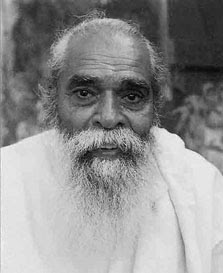
Ganapathi Venkataramana Iyer was an Indian film director and actor. He was nicknamed "Kannada Chitra Bheeshma". His film Adi Shankaracharya (1983) won four National Film Award, including Best Film, Best Screenplay, Best Cinematography and Best Audiography. His film Swami Vivekananda (1998) was nominated in the Best Film category at the Bogotá Film Festival, for which Mithun Chakraborty won the national award for Best Supporting Actor.

Arundhati Nag is an Indian actress. She has been involved with multilingual Theatre in India, for over 25 years, first in Mumbai where she got involved with Indian People's Theatre Association (IPTA), and did various productions in Gujarati, Marathi, and Hindi theatre, and then in Kannada, Tamil, Malayalam and English, in Bangalore.

Dweepa is a 2002 Indian Kannada-language film by Girish Kasaravalli, based on the novel of the same name by Na D'Souza. It stars Soundarya, Avinash and M. V. Vasudeva Rao in the lead roles. The film deals with the raging issue of building dams and the displacement of natives. It won two National Film Awards, four Karnataka State Film Awards and three Filmfare Awards South.

Ramchandra P. N. is a filmmaker making feature films, short films, documentaries and TV programs. in India. He is a Tuluva based in Mumbai.
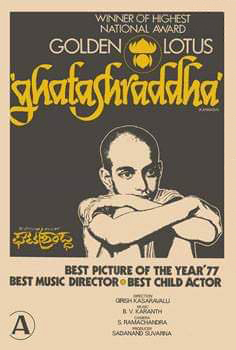
Ghatashraaddha is a 1977 Indian Kannada language film directed by Girish Kasaravalli starring Meena Kuttappa, Narayana Bhat and Ajith Kumar in lead roles. It is based on a novella by eminent Kannada writer U. R. Ananthamurthy. The film was Girish Kasaravalli's first feature film as a director, and marked not only the arrival of a promising new filmmaker but also that of Kannada cinema in the India's 'New Cinema' horizon.

Singeetam Srinivasa Rao is an Indian film director, screenwriter, producer, composer, and actor. He is widely regarded as one of India's most versatile and innovative filmmakers. He has directed around sixty films across multiple genres and languages, including Telugu, Kannada, Tamil, Hindi, and English and is credited with revolutionizing South Indian cinema through his experimental approach. He has garnered numerous accolades throughout his career, including two National Film Awards, five Nandi Awards, three Karnataka State Film Awards, and three Filmfare Awards South. In 2011, he was honoured with the Life Achievement Award by the Film Federation of India.

Pallavi Joshi is an Indian actress, writer, and film producer who works primarily in Hindi films and television. In a career spanning across films and television, Joshi is the recipient of such accolades as three National Film Awards, and a nomination for the Filmfare Awards.
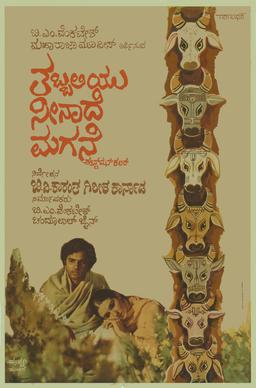
Tabbaliyu Neenade Magane or Godhuli is a 1977 Indian drama film co-directed by Girish Karnad and B. V. Karanth, starring Kulbhushan Kharbanda, Maanu, Om Puri and Naseeruddin Shah. It is based on the Kannada novel Tabbaliyu Neenade Magane, written by S. L. Byrappa as an allegory for nation-building and the clash of modernity with tradition in rural India. It portrays the story of a modern agriculturist who returns from the US after studying agriculture and brings his American wife to the village. The film won the Filmfare for ‘Best Film’ (Kannada) and Maanu won ‘Best Actor’ (Kannada) at the 25th Filmfare Awards South (1978). The film was made in Hindi and Kannada versions: Godhuli.
The 25th National Film Awards, presented by Directorate of Film Festivals, the organisation set up by Ministry of Information and Broadcasting, India to felicitate the best of Indian Cinema released in the year 1977. Ceremony took place on 27 April 1978.
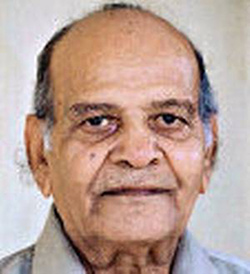
J. Chandulal Jain was a popular Kannada film director and producer of almost 40 films, notably, Thaaye Devaru, Bhootayyana Maga Ayyu, Tabbaliyu Neenade Magane, and Bhakta Siriyala. He also produced movies in Hindi, such as Godhuli and Pyaar Karke Dekho. His film Idu Saadhya was shot in just 48 hours.

Bara is a directed and produced by M. S. Sathyu. It is based on the novel of same name by U. R. Ananthamurthy. Simultaneously shot in Kannada and Hindi, the film starred Anant Nag, C. R. Simha and Loveleen Madhu in lead roles. The film won many laurels upon release including the National Film Award for Best Feature Film in Kannada for its script of an incisive analysis of the socio-political situation in a drought affected district. The film went on floors in 1980 and made its theatrical release in 1982.
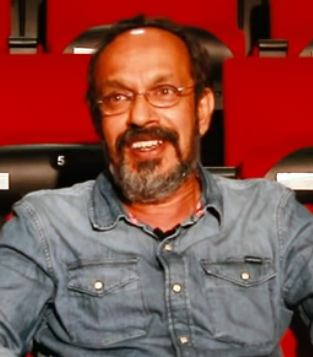
B. Suresha is an Indian film director, producer, screenwriter, and actor who works in Kannada-language films. He is known for directing the films Artha (2003) and Puttakkana Highway (2011).


















